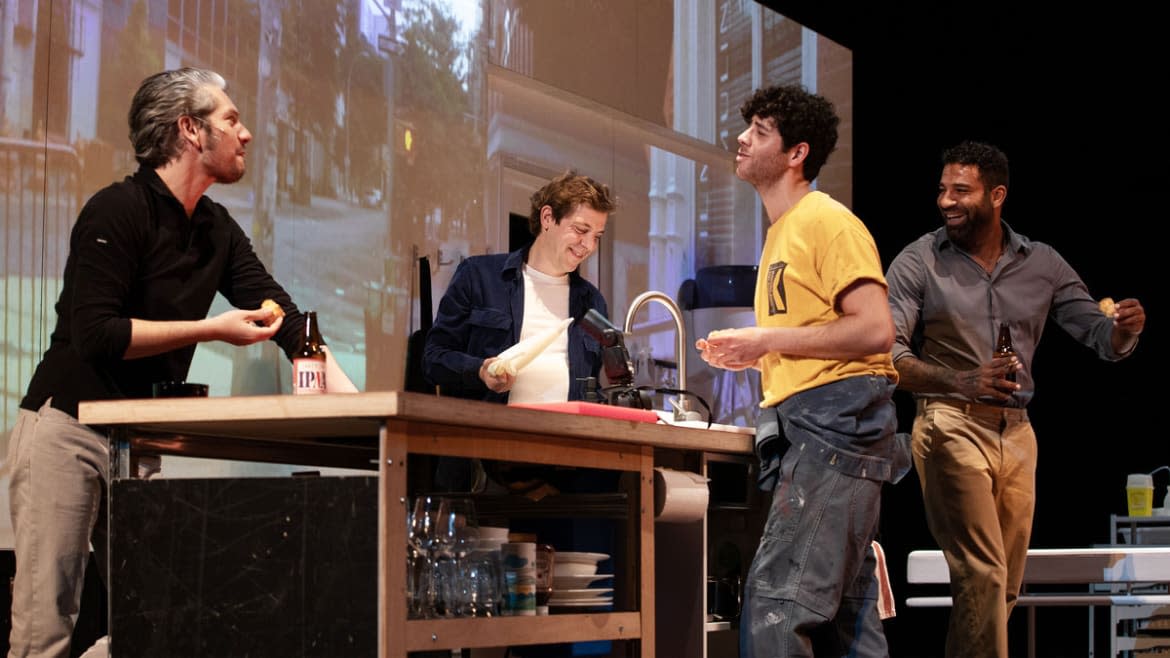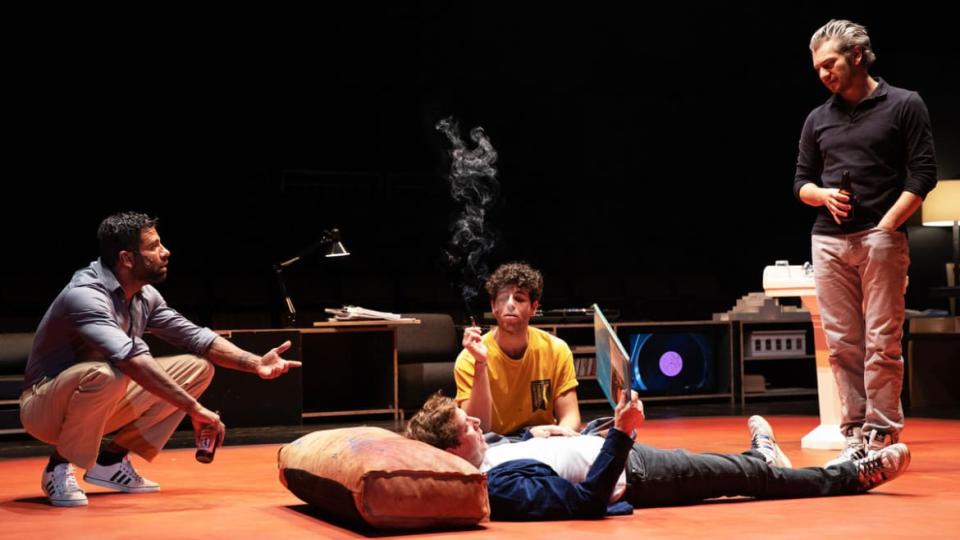Bestselling Novel ‘A Little Life’ Is Now an Epic Piece of Theatrical Torture Porn

- Oops!Something went wrong.Please try again later.
- Oops!Something went wrong.Please try again later.
There is a stall selling copies of Hanya Yanagihara’s A Little Life in the BAM Howard Gilman Opera House foyer; there should also be T-shirts on sale with the banner, “I Survived A Little Life.”
In the four-hour, fifteen-minute span of the play (showing to Oct. 29) based on the bestselling novel, all other narrative foliage has been removed—there is really only one story, and that is the torture and abuse of the main character Jude St. Francis (Ramsey Nasr). This abuse is relentless in noted theater originator Ivo van Hove’s production for International Theatre Amsterdam. (The actors speak Dutch; there are subtitles in English projected above them.)
On an open stage, compartmentalized into elements of characters’ residences and work spaces, we see Jude stripped, denigrated, hit, mocked, gaslit, fucked and screwed up and abused as a child, and pimped out as a pre-teen prostitute. As an adult, we see him burnt, we watch him scream and howl in pain, we see him abused by a vile boyfriend, we see him cut himself over and over again bleeding all over the floor. Nasr’s is a virtuosic performance, and also disturbing and unbearable.
Ivo van Hove’s ‘The Damned’ Is Shocking, but Predictably So
One can see the artistic choice being made here by van Hove; Jude’s abuse is indeed the center of the novel, and a play necessarily strips away all the lyricism and B-road character interplay that is otherwise part of the novel. But, as the book’s critics have said about it, what is A Little Life beyond the relentless debasement of its central character, and the play distills that central story without any buffering niceties. Van Hove dwells, rubs our faces, in Jude’s physical and psychological demolition.
The quartet of friends that are central to the novel—Jude, Willem (Maarten Heijmans), JB (Majd Mardo), and Malcolm (Edwin Jonker)—are present for some laughs and levity, but not as much as they are in the book. More prominent is Hans Kester, as the three main male characters who abuse Jude with ruthless, character- and body-destroying intent; ‘Brother Luke,’ who screws with his mind and body as a child, Dr. Traylor, a crazy freak who ends up disabling him, and Caleb, a later boyfriend, who mocks, beats, imprisons and wrecks him further. Jan Versweyveld’s scenography and lighting skillfully adds tension and dread, alongside live-played, plaintive music.
And so it is that van Hove’s A Little Life becomes a theatrical endurance test. On Thursday night, its first performance, many people walked out—some during the performance as Jude’s situations became more and more appalling and his suffering graphically intensified. An interval came about two hours and fifteen minutes in, and more visibly done-in audience members left during that. One can understand why; A Little Life is grim, and when you think it can’t get any more grimmer it exponentially does. It keeps upping its own ante of viciousness and violence.
Indeed, at the end, when Jude has finally revealed the full truth of all that he has endured and you think, finally, no more—haha suckers, nope, there is. And things get worse again, horribly. And then after that, when you think things can’t get any worse they do. And then, after that, when you think there is nothing else that can go hideously wrong, oh yes it can. Relief is nowhere to be found; the last seconds are an exhausted lament.

(l) Edwin Jonker, Ramsey Nasr (lying down), Majd Mardo (smoking), Maarten Heijmans (r) in 'A Little Life.'
And yet, this critic found A Little Life mesmerizing in a—oops, spoiler—car crash kind of a way. The show is so luridly laser-focused, we are rubbernecking a human being broken to pieces. One wonders if those people leaving A Little Life are doing so because of what they are seeing Jude go through, or perhaps reached individual points of psychological no-return themselves, understandably triggered by Jude’s bran-tub of abuses and neuroses.
But there is also the question of why we are watching Jude put through all this. To what narrative end? What is the point, beyond watching the endless torture itself? No answer to this presents itself on stage.
So, is there any relief from watching Jude get physically and psychologically beaten up for four hours? A few glints of light are soon snuffed out or darkened. A sweet man, Harold (Jacob Derwig), adopts him, and spends much of the play puzzlingly chopping what are presumably vegetables. He is spat on when he tries to intervene at one point. The speaking spirit of a dead savior, Ana (Marieke Heebink), tries—mostly fruitlessly—to counsel Jude away from self-destruction. Andy (Bart Slegers) gives Jude all the medical attention he needs, and much love besides. (His formidable skills range from bandaging to amputation.) The stage really needs his hospital station.
There is the comfort of Willem, Jude’s true love, who is the play’s attempt at showing that same-sex sex can be good and not abusive and terrible; that positive and warm love with another man is possible. But first Jude must admit that he is gay, then that he loves Willem, then they can’t really have sex because of all the abuse Jude has suffered, then they have sex but it’s not great, then there are more painful memories, then they fall apart under the weight of all the trauma, then Willem picks up a razor… and, well, then there is even more bloody tragedy.
An audience message of thanks is due to JB for the jokes and bitchiness he brings to the show—though these are few; still, when they happen you laugh probably harder than the lines deserve through sheer gratitude at their intrusion into this cavalcade of brutality.
Jude seems less a character, and more a sadism pin cushion; throughout the production he continues to wear bloodied clothes to underscore how wounded he is, even when he isn’t being actively wounded.
It is odd, at the end of the play, to hear him praised as a fantastic cook, baker, lawyer—because we see none of this in the play. In the play Jude is a victim over and over again. We hear at the beginning that everyone is fascinated by him, that he possesses some unearthly, hot magnetism. Maybe it’s the theater—the stage feels miles away, even from the orchestra seats—and maybe it’s the fact he is always in so much debilitating pain, but, although he seems relatively handsome and charming, you are less bowled over by Jude’s charisma and more focused on someone who is already vulnerable and broken only becoming more vulnerable and broken as the four plus-hours continues.
As in some horror films, you want to shout: Get out of there. Someone do something. Then: Oh please, put him out of his misery. Jude goes from nervy human, to horribly damaged soul, to seeming like a battered, barely sentient woodland creature.
The non-stop abuse and degradation does not detract from the reality that van Hove has produced yet another bonkers original. There is nothing like A Little Life on the New York stage; nothing that looks like it, nothing that ranges so wildly as it does; nothing as challenging, nothing as ferociously committed to its vision. There was a standing ovation on Thursday night, for Nasr, deservedly so—and maybe also for the audience itself, for staying and seeing this gnashing beast of a production through to its thuddingly bitter end.
Get the Daily Beast's biggest scoops and scandals delivered right to your inbox. Sign up now.
Stay informed and gain unlimited access to the Daily Beast's unmatched reporting. Subscribe now.

